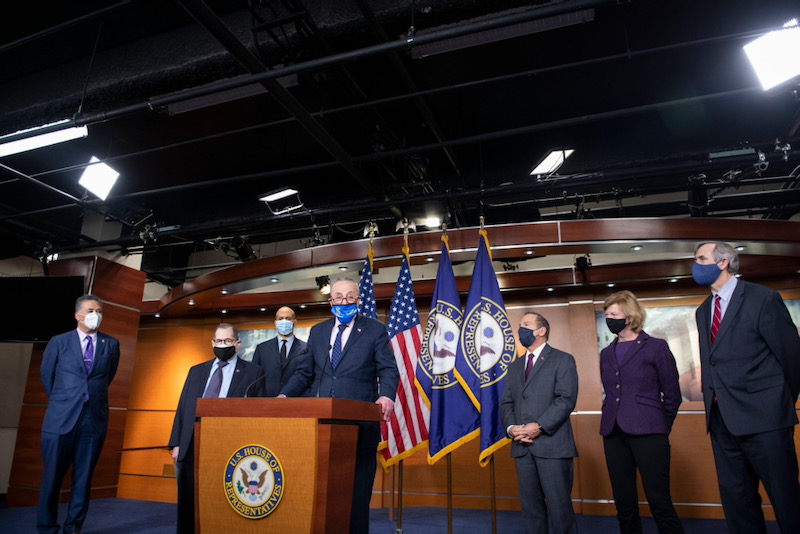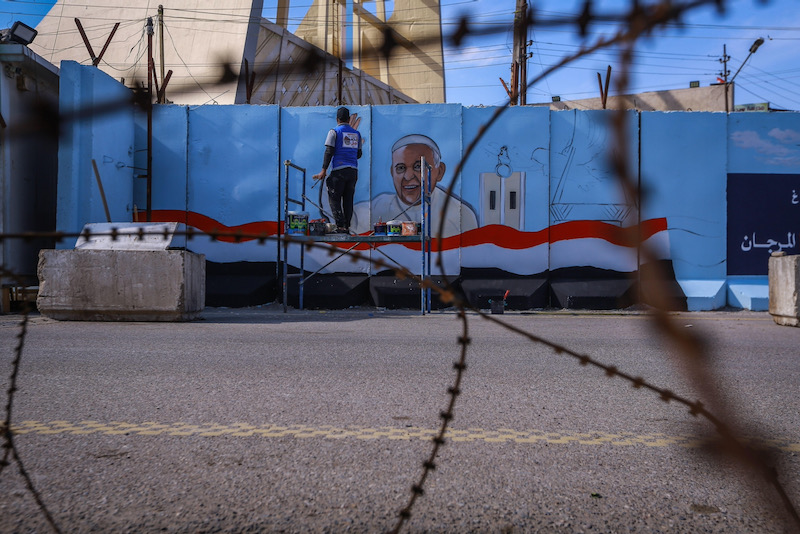Pope Francis is due to begin his visit to Iraq this Friday, the first overseas trip he has made since the pandemic began.
His determination to proceed with the trip signals the significance he is placing on the ongoing plight of Iraqi Christians, and on the issue of Muslim-Christian relations.
Speaking today after the Angelus, the Pope said: “The day after tomorrow, God willing, I will go to Iraq for a three-day pilgrimage. For a long time I have wanted to meet those people who have suffered so much; to meet that martyred Church in the land of Abraham. Together with the other religious leaders, we shall also take another step forward in brotherhood among believers.
“I ask you to accompany this apostolic journey with your prayers, so that it may unfold in the best possible way and bear the hoped-for fruits. The Iraqi people are waiting for us; they awaited Saint John Paul II, who was not permitted to go. One cannot disappoint a people for the second time. Let us pray that this journey will be a good one.”
The trip marks the first visit by a Pope to Iraq, the previous attempt by St John Paul II, as the Pope alluded to, having been frustrated by Saddam Hussain. The trip occurs as Iraqi Christians trickle back into their historic communities after being forced to flee by ISIS, and churches are just starting to be rebuilt. Only a fraction of Iraq’s historically numerous Christian population remains in the country, a process that began with the outbreak of sectarian violence and Islamic terrorism in the wake of the American invasion of Iraq.
| Why Pope Francis' visit to Iraq could be the riskiest trip to date of his pontificate. Christopher Lamb analyses the historic journey. |
According to the Tablet’s Rome Correspondent, Christopher Lamb, the Pope’s visit “is the riskiest trip of his pontificate”. Speaking to a Religious Media Centre briefing on the visit, Lamb said that “the Pope is determined to go ahead with the trip”. He noted that the Vatican had described the trip as “an act of love from the Pope towards a country that has suffered terribly in recent decades”.
The trip is also of great importance to Iraq’s civilian government, who will be hoping that it will show the world that Iraq is safe again in the wake of Islamic State’s defeat.
Some have criticised the timing of the trip which occurs against the backdrop of the continuing spread of coronavirus, but the Vatican has taken extensive precautions. All the members of the delegation from Rome, including the press, will have received vaccinations ahead of travelling to Iraq, and social distancing and masks will be required at public events.
The trip will focus on the cities Erbil, Mosul and Qaraqosh, where the Pope will show solidarity with Christians attempting to rebuild their lives and religious communities, including a public mass in a football stadium in Erbil. Great emphasis is also being placed on interreligious harmony with a mutli-faith prayer service due to be held at the remains of the ziggurat at Ur, where Abraham is believed to have been born. The service will include members of all of Iraq’s religious faiths including not only both Sunni and Shia Muslims, and the many Christian denominations, but also members of the Zoroastrian, Yazidi and Jewish communities of Iraq.
One of the most significant events on the itinerary however, is occurring in a small house in Najaf, where the Pope will be meeting the man that many regard as the spiritual leader of Iraq, the Shia cleric Grand Ayatollah Ali al-Sistani. Sistani is often considered to be a moderate counterweight to the more theocratic and sectarian Shiite religious leadership of Iran, and at a time when Iranian backed Shia militias are still a menacing presence for minorities, his role in a multi-religious Iraq could prove crucial. Both leaders will be making unusual signs of respect, with the Pope agreeing to remove his shoes as he enters the Ayatollah’s home, and the Ayatollah agreeing to stand to greet him, despite this being difficult for him due to his fragile health.
Iraq’s Culture Minister Hassan Nadhem said: “I see the Pope’s visit to Najaf as the culmination of a global movement in the Islamic-Christian tradition to promote security and peace in our country.”



 Loading ...
Loading ...